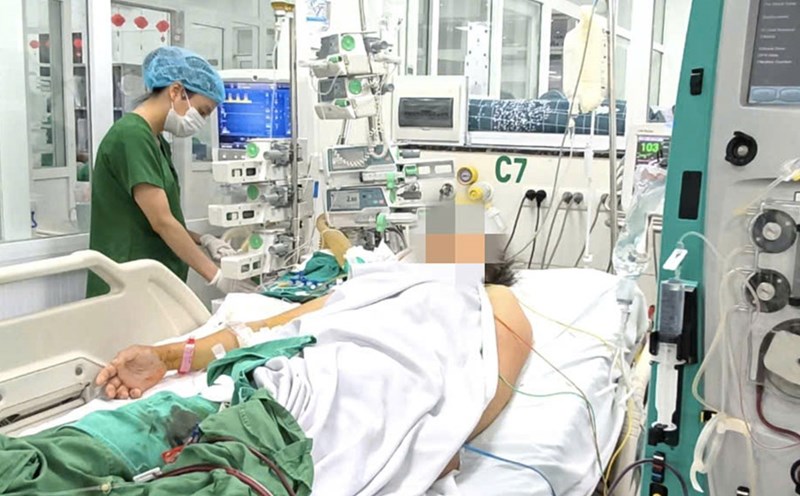The mother Nguyen Thien Huong (character's name has been changed, 32 years old, Ho Chi Minh City) was pregnant at 32 weeks, the patient went to the hospital for examination and underwent comprehensive tests but did not detect dengue fever. However, after about 4 days, the patient felt muscle pain and pain, so she returned to a lower-level hospital for examination, Ms. Huong had her blood taken for testing and was diagnosed with dengue fever, so she needed treatment.
However, Ms. Huong did not expect that the dengue fever had turned worse and threatened the lives of both mother and child. When admitted to the hospital, the patient's platelets were still 239, reduced to 50 units after 1 day, the doctor thought this was dangerous because Ms. Huong was pregnant. Two days later, the plateau was reduced to 127, so the doctors advised him to be transferred to the higher level for further treatment.
According to doctors, for pregnant women, rapid platelet reduction is dangerous and is a serious prediction. After 4 days of treatment, the patient's condition improved, however, Ms. Huong showed signs of rupture of the water, after consultation, the mother had surgery to take her child and both mother and child were safe after surgery.
Dr. Vu Dinh An - Head of the Intensive Care Unit, Military Hospital 175 said that during the rainy season, the number of severe dengue fever cases increased significantly. The worrying thing is that many cases are aggravated not because of the stronger virus, but because of subjectivity, from people and health workers at the grassroots level, delaying detection, monitoring and timely medical intervention.
According to Dr. An, high-risk groups that need special attention include: infants, pregnant women, obese people, the elderly and patients with many underlying diseases. Even if the initial symptoms are mild, just fever, if the patient is in these groups, they need to be taken to the doctor and closely monitored, because "only a quick progress is needed" can lead to shock, severe digestive bleeding, multiple organ failure.
The doctor cited the fact that the Resuscitation Department has recently received seriously ill patients. There was a case of a 41-year-old who was admitted to the hospital on the sixth day of the disease and was in shock, with severe gastrointestinal bleeding; another patient with an obese state (over 100 kg) admitted to the hospital on the fourth day had a serious condition and had to be resuscitated actively. Previously, a young coach was also hospitalized late, with poor dichament compensation and high blood pressure leading to multiple organ failure and had to receive a large amount of blood transfusion to save his life.
Dr. An emphasized the rapid nature of dengue fever: the disease usually goes through three stages, fever stage (1-3 days), dangerous stage (around 3-7) and recovery stage (after 7 days). Dangerous periods can come very quickly and cause epidemics, internal bleeding, overflow, leading to organ failure (liver, kidney, respiratory, cardiovascular). Even after the 7th day, some patients may still experience complications due to the "recovering" epidemic in the cardiovascular system, causing the heart to suddenly suffer a burden.










